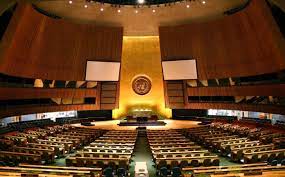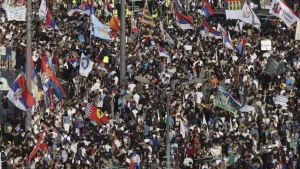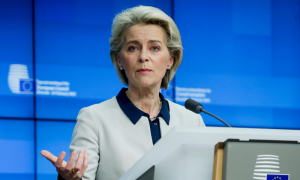UNGA votes to demand Russia reverse course on ‘illegal’ annexations in Ukraine; Pakistan abstains

United Nations: With Pakistan abstaining, the UN General Assembly adopted a resolution by a large majority Wednesday, calling on countries not to recognize the four regions of Ukraine which Russia has claimed, following so-called referendums held late last month, and demanding that Moscow reverse course on its “attempted illegal annexation”.
The vote in the 193-member world body was 143 in favour to five against, with 35 abstentions.
The resolution “defending the principles” of the UN Charter, notes that the regions of Donetsk, Kherson, Luhansk and Zaporizhzhia are temporarily occupied by Russia as a result of aggression, violating Ukraine’s territorial integrity, sovereignty and political independence.
Explaining his vote, Pakistan’s Ambassador to the UN, Munir Akram, regretted that the co-sponsors of the resolution did not accept proposals for an immediate peaceful resolution of the conflict.

“Irrespective of the origin of the conflict, the highest priority, at this moment, is the immediate cessation of hostilities and the resumption of a peaceful dialogue – through direct negotiations, mediation or other peaceful means – to resolve the causes of the conflict and restore peace and security in Ukraine,” he said.
“Unless we halt the conflict, there is every likelihood that it will escalate further, with consequences that could be devastating for the entire world.”
As regards the referenda mentioned in the draft resolution, the Pakistani envoy, while acknowledging Ukraine’s complex history, said, under international law, the right of self-determination applies to peoples who are under foreign or colonial domination, and those who have not yet exercised the right to self-determination, as in the case of Jammu & Kashmir.
“We look forward to seeing similar concern and condemnation about the attempts by India to formalize its illegal annexation of the internationally-recognized disputed territory of Indian Illegally Occupied Jammu and Kashmir in complete violation of international law and relevant resolutions of the UN Security Council on Jammu and Kashmir,” the Pakistani envoy added.
Moreover, he said, the exercise of the right to self-determination should be conducted in an environment free of military occupation and under impartial auspices, preferably under the supervision of the United Nations.
Pakistan, therefore, endorses the basic principle reflected in the draft resolution that referenda conducted for peoples and regions which are part of a sovereign state and in an environment which is not free and not under impartial auspices, are ultra vires and legally unacceptable.
“Unfortunately,” Ambassador Akram added, “the resolution contains several provisions which go beyond declaring the referenda null and void and includes provisions which Pakistan is unable to endorse.”
The Indian ambassador, Ruchira Kamboj, while explaining India’s abstention on the resolution, also reacted to Ambassador Akram’s statement in which he denounced India’s annexation of Jammu and Kashmir.
The Indian envoy claimed that Jammu and Kashmir was an internal matter of India, and accused Pakistan of involvement in terrorism.
Exercising his right of reply, Pakistan’s delegate Gul Qaiser Sarwani, rejected India’s claim that Jammu and Kashmir was its part, saying the United Nations maps show the territory Kashmir as a “disputed territory.”
“The biggest falsehood that we just heard is that Jammu and Kashmir is a part of India,” the Pakistani delegate said.
Under the terms of the UN resolutions, the final disposition of Jammu and Kashmir is to be determined by its people through a UN-supervised plebiscite, Sarwani said, pointing out that India had accepted this resolution and was bound to comply with it in accordance with UN Charter’s Article 25.
In Kashmir, he added, the oldest United Nations peace-keeping force (UNMOGIP) is deployed along the Line of Control (LOC) in the disputed region.
“If India has any respect for international law and moral courage, it will end its reign of terror, withdraw its troops and let the Kashmiris freely decide their future in accordance with the Security Council resolutions…”
The Pakistani delegate also rejected India’s accusation of involvement in terrorism, saying aggressors, colonizers and occupiers often attempt to justify their suppression of legitimate struggles for self-determination and freedom by portraying them as “terrorism”.
On its part, the General Assembly automatically took up the resolution for debate, triggered by Russia’s use of the veto in the Security Council over it’s attempted annexation.
The resolution now passed in the Assembly, calls on all States, the UN and international organizations not to recognize any of Russia’s annexation claim and demands the immediate reversal of its annexation declaration.
The resolution welcomes and “expresses its strong support” for the continued efforts by the Secretary-General and member states, to de-escalate the current situation in search of peace through dialogue, negotiation and mediation.
The debate over the Ukrainian resolution began on Monday, with the General Assembly President Csaba Korosi telling the Assembly that the UN Charter, the Secretary-General, and the Assembly itself had been clear – Russia’s invasion, and attempted annexation of Ukrainian territory by force, “is illegal”.
Since Monday morning, Russia has launched dozens of missiles targeting civilian areas of multiple Ukrainian cities, leading to dozens of deaths and injuries, in retaliation for the bombing of Russia’s bridge to Crimea on Saturday. UN Secretary-General Antonio Guterres said the assault was “another unacceptable escalation” in Russia’s February 24 invasion of its neighbour.
Speaking at the start of the debate on Monday, Korosi, the Assembly president, said that “when it becomes a daily routine to watch images of destroyed cities and scattered bodies, we lose our humanity … We must find a political solution based on the UN Charter and the international law.”
The debate began with a procedural vote on a measure which Russia had flagged, proposing that the Ukrainian draft resolution being debated, be voted on by secret ballot, not through an open recorded vote.
The Albanian proposal received 107 votes in favour, with 13 against, and 39 abstentions, with the country’s representative arguing that it would establish a “dangerous precedent” if such a substantive issue of peace and security was voted on in secret.





